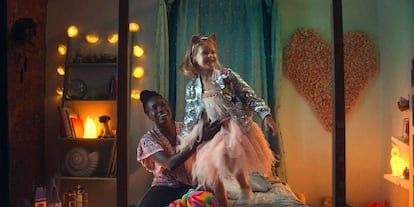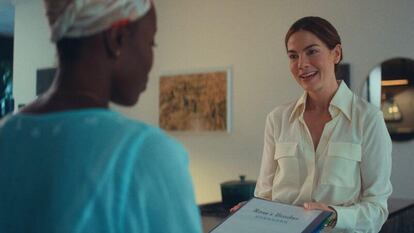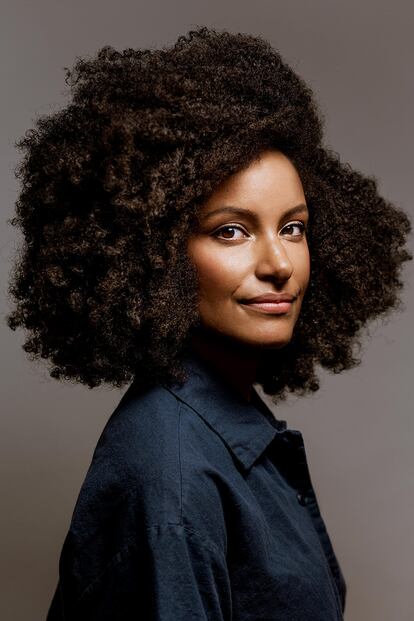With a dose of realism, the nanny cliché is repealed in film and writing
The horror film ‘Nanny’ and some literary works do away with the stereotypes to show the vulnerability and racism that these domestic workers face


A love letter to a mother mixed with a fable of psychological and folk horror, Nanny, the debut of filmmaker Nikyatu Jusu that won the Grand Jury Prize at the last edition of the Sundance Film Festival, had gone unnoticed by the general public until director Guillermo del Toro put it on the radar: “Hypnotic horror film. Symbol, myth and spirit join to tell an internal saga. Fraught with danger, menace and full of mystery and power. Its remarkable color palette and rock-solid audiovisual storytelling rematched by breathtaking performances,” he tweeted at the end of December, a few days after the production premiered on Prime Video and after it was announced that Jusu would be in charge of directing the sequel to Night of the Living Dead that Amazon is working on.
Jusu, the daughter of migrants from Sierra Leone, with an MFA in film production from New York University and recipient of the Spike Lee scholarship, made her debut with the story of Aisha (played by Anna Diop), an undocumented Senegalese woman who works as a nanny for a privileged white couple (Michelle Monaghan and Morgan Spector) in New York’s Upper East Side. Her only goal is to raise as much money as she can so she can bring her son Lamine to the United States. However, strange visions haunt her conscience, guilty for having migrated without him.
Working to death
Delving into the fears and experiences of those mothers who leave their own children in their countries of origin to go raise other people’s sons and daughters was a lifelong obsession for this director. Her own mother was one of those domestic caregivers who spent the day away from home, between multiple jobs, looking for a better future. What leads a mother to sacrifice herself like this? What guilt does she carry? What toll is paid in this mother-child separation? And how are those nannies actually treated in these houses?
Nanny searches for answers in a film that defines the American dream as “working until you die.” It does so by relying on two West African myths (Mami Wata and Anansi) to convey the tensions and oppressions of class, gender and race suffered by its main character; experiences as subtle as they are devastating, that make witnessing the suffocating nightmares suffered by the protagonist—stalked by a Haitian deity of water—almost as terrifying as watching a millionaire demand gender compassion from a person that they exploit at work.

Their stories, from their point of view
Jusu is not the only one that explores the realities of female caregivers from their own point of view. For a few years now, fiction and literary essays have focused on the lives of those women who populate the playgrounds of Europe and the United States; stories that do away with the fantasy of the candid and devoted Mary Poppins-style nanny as well as the archetype of the overly sexual babysitter who threatens the family order.
Writer Emma Cline reversed the cliché of the homewrecking babysitter in The Nanny (one of the stories included in Daddy, her latest book), by putting herself in the shoes of the victim and exposing the vulnerability of those domestic employees who are both conflicted and exploited by the system, transforming one of Hollywood’s favorite tropes: a sensual young woman who sexually torments the patriarch or the protagonist, like the ones played by Alicia Silverstone in The babysitter (1995), Marilyn Monroe in Don’t Bother to Knock (1952) or Lio Tipton in Crazy Stupid Love (2011).

“I’m just a sitter. I’m not a nanny,” explained Emira, the main character of Such a Fun Age, in a display of disdain for her own livelihood. “Nannies are full-time. They’re salaried and they get bonuses and vacations. And babysitters are part-time, and they do like... date nights and emergencies.” The debut novel of writer Kiley Reid, who worked taking care of other people’s children for six years in order to pay off her university loan, tells the story of a 25-year-old African-American girl who suffers a racist episode in a supermarket while taking care of the (white) daughter of her bosses when a security guard assumes that the child had been kidnapped.
This novel about women who usually have no rights or health insurance, in which race, classism and the problematic boundaries between “work” and “personal” of some employers (as progressive and left-wing they consider themselves to be) converge, was long listed for the Booker Prize, as well as a New York Times bestseller and a selection of Reese Witherspoon’s book club. In addition, its television rights were bought by Lena Waithe (co-writer and actress of Master of None).
Sign up for our weekly newsletter to get more English-language news coverage from EL PAÍS USA Edition
Tu suscripción se está usando en otro dispositivo
¿Quieres añadir otro usuario a tu suscripción?
Si continúas leyendo en este dispositivo, no se podrá leer en el otro.
FlechaTu suscripción se está usando en otro dispositivo y solo puedes acceder a EL PAÍS desde un dispositivo a la vez.
Si quieres compartir tu cuenta, cambia tu suscripción a la modalidad Premium, así podrás añadir otro usuario. Cada uno accederá con su propia cuenta de email, lo que os permitirá personalizar vuestra experiencia en EL PAÍS.
¿Tienes una suscripción de empresa? Accede aquí para contratar más cuentas.
En el caso de no saber quién está usando tu cuenta, te recomendamos cambiar tu contraseña aquí.
Si decides continuar compartiendo tu cuenta, este mensaje se mostrará en tu dispositivo y en el de la otra persona que está usando tu cuenta de forma indefinida, afectando a tu experiencia de lectura. Puedes consultar aquí los términos y condiciones de la suscripción digital.








































